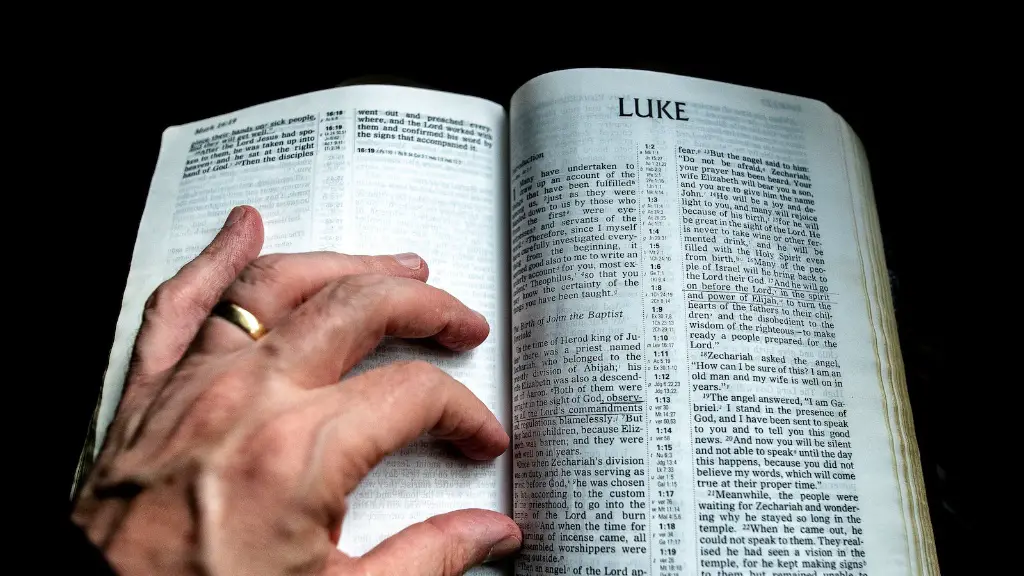Is Muhammad mentioned in the Bible? According to many Muslims, the answer is yes, and this has led to much discussion and debate over the years.While some see Muhammad as an important prophet of Islam mentioned in the Bible, others find this claim unconvincing. To gain a better understanding of this divisive topic, we must examine the evidence from both sides of the argument.
The first point to consider is the textual evidence in the Bible itself. As far as any explicit references to Muhammad are concerned, none can be found anywhere in the Bible. The book of Revelation mentions a certain ‘unveiled’ man riding a white horse – a figure many Muslims interpret as Muhammad – but it should be noted that this is highly speculative and several other interpretations are available.Other than that, there are no mentions of Muhammad in any other books in the Bible.
But whether or not Muhammad is mentioned explicitly in the Bible, many Muslims assert that his coming was nonetheless predicted by the Bible. They believe that certain passages related to the return of Jesus or the appearance of an ‘elijah’ figure refer to Muhammad, and these serve as a sign that Muhammad was indeed prophesied. For instance, some Islamic circles interpret the following verses from Isaiah 29:12-13 to be a reference to Muhammad: “Therefore thus saith the Lord, which bringeth back the captivity of Jacob, and have compassion upon the whole house of Israel; Behold I will bring forth My servant the Branch…”
These interpretations, however, rely heavily on reinterpreting the text – a practice that some may find problematic. Moreover, those who interpret Biblical passages explicitly reject these claims, pointing out that such verses refer only to Jesus, who is viewed as the central figure of the Bible from a Christian perspective. Even if we assume that some of these passages do actually refer to Muhammad, these believers may still interpret them as prophecies fulfilled by Jesus.
Proponents of the notion that Muhammad is mentioned in the Bible also often cite various non-Biblical sources. For instance, there are several non-canonical texts such as the “Testament of Abraham” which some believe refer to Muhammad, and these can be used to make the case that Muhammad was indeed mentioned in the Bible.
All in all, interpreting the Bible is a complex and difficult task, and the idea that Muhammad was mentioned anywhere in it remains highly contested. While some believers may interpret certain passages as references to Muhammad, others are likely to reject this idea altogether. Ultimately, whether one believes that Muhammad is mentioned in the Bible or not depends on one’s own faith and interpretation of the Bible.
Similarities between Muhammad and Jesus
The similarities between the teachings of Muhammad and Jesus are often cited as a sign that Muhammad is indeed mentioned in the Bible. For example, both of them had similar messages of peace and justice and both of them preached mercy and compassion to their followers. In fact, both of them called for their followers to “love their enemies” and both of them believed in being patient and humble when responding to aggression and injustice.
Moreover, both Muhammad and Jesus are described as having great moral character and both of them preached integrity and honesty in their respective teachings. They also both claimed to be messengers sent from God, and their messages had a similar emphasis on faith and submission.
Perhaps the most striking similarity between the two teachers is that their lives ended in similar ways: both of them died after suffering extreme persecution and both of them were eventually vindicated and viewed as messengers of God. These parallels offer strong evidence that Muhammad‘s teachings and life were indeed mentioned in the Bible.
However, there are also significant differences between the two prophets. For instance, where Jesus relied heavily on miracle-based proofs of his divinity, Muhammad was instead known for his wise and powerful proclamations and actions which drew large crowds. Moreover, while Jesus often preached to heal the ills of society, Muhammad was primarily focused on forming strong communities and practicing strict standards in everyday life.
References to Muhammad in Non-Biblical Sources
Although there are no explicit references to Muhammad in the Bible, it is possible to find references to him in other religious texts. For instance, the Quran mentions several prophets from the Bible such as Moses and Abraham, and some scholars believe that Muhammad is among them.
Moreover, there are some non-canonical texts that make reference to Muhammad. The “Testament of Abraham”, for instance, is one of these non-canonical texts and some believe it to be a reference to Muhammad.
Finally, there are also references to Muhammad in other Islamic texts. For instance, in the Hadith, Muhammad is described as the “seal of the prophets” – a title that is also used in the Quran. This suggests that Muhammad was indeed mentioned in the Bible, albeit indirectly.
Arguments Against Muhammad’s Mention in the Bible
While some argue that Muhammad was mentioned in the Bible, there are others who disagree and consider such claims to be unfounded. Chief among these arguments is the lack of explicit references to him anywhere in the Bible – a shortcoming that many believe rules out any possibility of Muhammad being mentioned in the Bible.
Furthermore, there are those who believe that such claims detract from the notion of Jesus being the ultimate messenger of God. As such, many Christians reject the idea of Muhammad being mentioned in the Bible as it detracts from their own religious beliefs.
Finally, some argue that the similarities between the lives of Muhammad and Jesus are too great to be coincidence. This implies that either Muhammad mentioned in the Bible or Jesus found in the Quran, but not both. As such, those who believe in the centrality of Jesus in the Bible may reject any attempt to find references to Muhammad in the Bible.
Conclusion
In conclusion, the idea of Muhammad being mentioned in the Bible continues to invoke much debate and disagreement among believers and faith communities. While some argue that there are clear references to Muhammad in certain passages of the Bible and other religious texts, others reject these claims due to a lack of explicit evidence. Ultimately, one’s opinion on this matter may depend on their own perspective and interpretation of religious texts.

